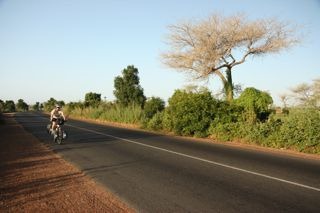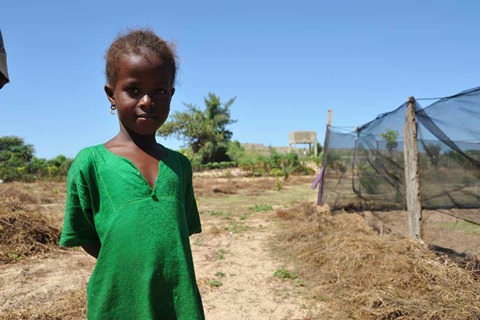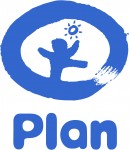Title: What a Start
Dates: 20th-24th October GPS: N 15.51.873, W16.30.739
Distance: Total Distance: 266km
Weather: 36-40 degrees, humid, head and cross winds mostly

(Editor’s note: Kate wrote this 6 days ago, but has had internet trouble so the posting was delayed. You can hear an update of the last 6 days via her Podcast [see the far right of the home page, or search in iTunes to access it]. There should be another update in 4 days or so.) We’d found out that the most westerly point is a pile of rocks which can only be accessed by walking through grounds owned by a restaurant which is closed in the mornings. Therefore, to get our bikes and ourselves to the most westerly point we visited at sunset the night before we were due to leave. The gate to the walkway was locked so, determined to reach the most westerly point we scaled the fence like fugitives and snapped heaps of photographs. Fortunately the tide was out so we were able to carry the bikes over the rocks and around the restaurant grounds to get out.
John and Simon had made excellent time driving the vehicle from the UK to Senegal. We had agreed to meet in St Louis (Dan, Paddy and I were going to make a start from Dakar), but they were able to make it all the way to Dakar so the team could be together for the start. Negotiating a terrible traffic jam in Dakar, they arrived late evening on the 20th.
The 21st was finally upon us. The team and our supporters drove to Point Almadies. It took quite some time to ensure the camera equipment was set up properly – the most important part of the journey to film is the start, so we cannot afford to get it wrong. Dan and I finally set off at 9.30am – the day already very hot and humid.
The first few kilometres from Point Almadies to Yoff were sedate compared with what was to follow. I felt a great weight off my shoulders, finally starting after all the hard work in setting this expedition up. The leafy green avenue soon morphed into a chaotic scramble where road rules are non-existent. There is only one main route away from Dakar and the Cap Vert peninsula along the freeway and we had to compete with frenzied drivers, dust, choking fumes and a hot dry headwind. Buses, competing for business pull out regardless of what’s coming from behind and without indicating. John gave us some protection by driving close behind us in the city to prevent us being run down. This continued for about 50km, until we left Rufisque (one of the original French colonial settlements).
These conditions along with exhaustion from my perfect ‘detraining’ programme – from lack of sleep, illness and stress – took its toll. By lunch, I was feeling cooked where as Dan, who is 18 years younger than me, seemed bright and full of energy. We bypassed Thies (80km) and continued to Tivaoune passing beautiful groves of baobabs, where we had accommodation sorted out…or so we thought.
The pre-arranged plan didn’t work but fortunately we were put in touch with the brother of the person helping us in St Louis. Moussa invited us to his home. He escorted us through the back streets of his home town. By the time we reached his place we’d done 109km – not bad for Day 1!
Dan and I were on the road by 7.30am, not having fully recovered from the first day. We will have to get used to starting even earlier to beat the heat. Day 2 topped out at around 40 degrees in the shade but the heat radiating off the tarmac would have made the ambient temperature well up over 50 degrees when cycling. The scenery over the next 104km to Louga changed significantly; the land was much drier, studded with thorn trees and other acacias. We reached Louga at last light. To save money the plan was to drive to our campsite and base for the next few days at the Zebrabar, 20km south of St Louis, then return and complete the 50km (which we have now done) before heading onwards. For me the first two days of cycling were (not unexpectedly) the toughest start I’d had to any of my major expeditions.
The following day (Friday 23rd) we had arranged to visit Potou, a Millennium Village. These villages are innovative models to show how rural African communities can lift themselves out of extreme poverty. The purpose is to demonstrate how sustainable change can be made through community-led development. The initiative has been set up by a number of partners, such as the UN Development Programme, Earth Institute, Millennium Promise and the Japanese Government. A major financial supporter is Ericsson, one of our sponsors. The aim is for these communities to reach their Millennium Development Goals (MDG) by 2015. The villages (usually a cluster of villages rather than a single village) are selected in various countries across Africa because they are in specific vulnerable hotspots.
We were met by our guides Daoude (facilitator), Djiby (economist), Mocetapha (health coordinator) and Ousman (agricultural technician). Daoude spoke reasonable English and with our limited knowledge of French we managed to get the story. First we were shown around the hospital/medical clinic. Before the programme began in 2006 there was only one small hospital for a large region, now there are six. This means all women can now give birth in a hospital rather than at home. Eighty percent of the patients are treated for malaria, the biggest killer in this region. There is virtually no HIV/AIDS in Senegal. This has largely been attributed to the level of selenium occurring naturally in their diet which boosts resistance to many diseases. Sexual practices are no different in Senegal to other countries like Zimbabwe where there is 27% HIV/AIDS (from memory).

Next we were taken to the primary school. The number of primary schools in the region has been doubled over the last three years to about 60, allowing all children to receive a primary education (MDG 2). There is only one secondary school in the region. The Millennium Project is most importantly providing teacher training as well as school uniforms, equipment and facilities.
We were then taken to see the new mill machine. In the past women had to pound the millet and other grains manually, but with the mill it’s simply a matter of pouring the grain into the machine saving time which can be used for other important jobs. Our guides then took us to the beach to see the pirogues which have been donated to help out the fishermen. Finally we were visited a farmer (I would think of this as more of a market garden). He has received a boost with the provision of a small water tower for irrigation. He was incredibly well organised and with the ability to irrigate he was able to produce more different types of crops with a longer growing season; onions, tomatoes, aubergines, pineapples and a few other things.
Normally it would be difficult to record all this properly but while Paddy did the main filming, Dan used the second camera and John used my Nikon while I was being shown around. What a team!
St Louis was next of the agenda. Limam Diouf, a prominent businessman and former deputy mayor of St Louis, whom we met in Dakar arranged an official welcome at the Regional Council of St Louis (like a state/county/provincial government). The secretary explained the region’s strengths and weaknesses. St Louis was the capital of West Africa during French colonial times; its architecture reflects the town’s importance during these times, but since independence in 1960 little has been done to upkeep the infrastructure. The centre of the town (population – 200 000) is set on two islands which are classified as World Heritage sites. St Louis however is a poor region by Senegal standards, the average person roughly earning 25% less than the average Senegalese. The council however appears very dynamic and keen to develop and encourage overseas investment. Mr Diouf then took us to the Hotel de Ville to visit the Deputy Mayor, Mr Cisse, who was very articulate and, like the council, very supportive of what we are doing. They all love the concept behind the Breaking the Cycle project.
Mr Diouf is in the process of setting up a small bank for micro-loans. These initiatives are proving to be an effective means of giving women a leg up. Loans with minimal interest are given always to women (it does not work with men) to start up a business. Once up and running the loan is paid back. Here is an example of how a local businessman is investing in the future of his people – in his home town. I could see plenty of these types of initiatives going on. I will never get time to finish and post this blog if I write about all of them.
After a traditional lunch at Mr Diouf’s brother-in-law Paepe’s home, our tour continued minus Mr Diouf who had to return to Dakar (he had driven from Dakar to look after us). Paepe and Dit Franki, Premier Consellier National to the president of Senegal, and close friend of the president gave us the grand tour. Language was a bit of a barrier, but we got the main points. Mr Franki’s position seemed to get us celebrity treatment everywhere. When police at the check point saw who was in the car we were waved on.
The rest of our time has been spent organising ourselves for the journey ahead. Even though we have an experienced team, travelling with a support vehicle and making a documentary is far more complex than if I was cycling unsupported as before.
The internet has also been down, so I will have to use my satellite phone connection for the first time. The connection will be too slow to have any chance of uploading photographs, so you will have to wait until I have an opportunity to sort it out.
The next stint is a long 800km+ journey following the course of the Senegal River into Mali. This is the French colonial route in to West Africa. It should take 7-8 days to reach Kayes in Mali, our next major stop.
{ 8 comments }


